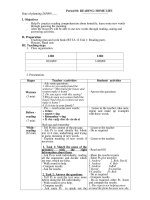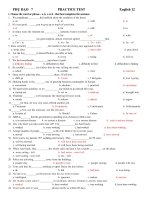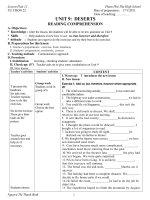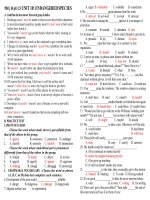Tu chon 7- Unit 3- Anh 12
Bạn đang xem bản rút gọn của tài liệu. Xem và tải ngay bản đầy đủ của tài liệu tại đây (87.25 KB, 3 trang )
PHỤ ĐẠO 7 PRACTICE TEST English 12
I.
Choose the word or phrase - a, b, c or d - that best completes the sentence.
1. We complained___________the landlord about the condition of the house.
a. on b. at c. with d. to
2. It's very good _ ______you to give up so much of your time.
a. of b. for c. with d. to
3 In many ways she reminds me______________someone I knew at school.
a. to b. for c. of d. with
4 _ ______________ _ my great surprise, almost everyone agreed_____________________him.
a. For - to b. At - for c. To - with d. In - of
5. Rosa certainly ___________ _ her mother in her devil-may-care approach to life,
a. looks after b. cares for c. takes after d. puts down
6. Let the boy__________it himself before you offer to help.
a. try b. to try c. trying d. will try
7. We had considerable___________anywhere to park.
a. difficulty finding b. difficulties to find c. difficulty to find d. difficulties to finding
8. He couldn't__________his father that he was telling the truth.
a. admit b. confide c. trust d. convince
9. Since you've asked me why____________there, I'll tell you.
a. -did I go b. I went c. I had gone d. was I going
10. Shaking hands is the_________way of greeting business counterparts in Europe.
a. convenient b. absolute c. practical d. customary
11. We need some sunshine; so we____________our minds to go abroad this year,
a. turned out b. set in c. made up d. brought into
12. If nobody__________, we'll postpone the meeting till next week.
a. minds b. refuses c. objects d. argues
13.________for him, he was very soon offered another job.
a. Fortunate b. Fortunately c. Unfortunate d. Unfortunately
14.________a fire, use the staircase, not the elevator.
a. In spite of b. Should c. Unless d. In case of
15. AIDS is_________that the government is spending a lot of money to find a cure.
a. a so serious disease b. so serious a disease c. so a serious disease d. such a serious disease
16. Jim, why don't you take some time off? You_____________too hard lately.
a. worked b. were working c. had worked d. have been working
17. A large number of people____________to Ho Chi Minh City in recent years.
a. moved b. were moving c. has moved d. have moved
18. Next year is my parents' 50
th
wedding anniversary. They________________for 50 years.
a. will be married b. will have been married
c. will being married d. will have been being married
19. When I got back, they___________the whole cake and just a few crumbs___________ on the plate.
a. were eating - left b. had eaten - were left
c. were eating - were left d. ate - left
20. Police are advising___________away from the building.
a. people stay b. people to stay c. people staying d. people will stay
21. Tom said that he__________nothing to upset Daisy the day before.
a. do b. did c. had done d. was doing
22. No one is so_________as the person who has no wish to learn.
a. intelligent b. ignorant c. useless d. unwise
23. It's twenty years since I____________in Germany and my German is pretty rusty now.
a. worked b. have worked c. was working d. have been working
24. If our work isn't to your___________, please notify us within 60 days.
a. satisfy b. satisfactory c. satisfaction d. satisfied
25. "Would you like to go to the movies tonight?" "________________."
a. No, I don't like b. Yes, I'd like c. Of course d. Yes, I'd love to
II. Read the passage carefully, then choose the correct answer.
Many people think that we can learn a lot about the culture of a foreign country simply by living in that country. However, this
is not necessarily true. Often, the longer we stay in a foreign country, the more we realize how little we actually know about the
culture of that country.
Books and talks about other people's culture can even be dangerous because they concentrate on cultural differences and
exaggerate national character, and sometimes a lot of information they contain is untrue.
In a study recently carried out in Britain, people were asked to make a list of anything that they thought was typical of
Britain and would interest a foreign visitor there. Most mentioned Shakespeare, the Queen, villages inns, English folk dancing,
English castles, and fish chips wrapped in newspaper. Although all of these characters can be found in British culture, they do not
show the real interests of ordinary British people: (They are, in fact, simply stereotype - that is, general character which people
wrongly think are typical.) What is surprising is that they were suggested by British people themselves as representing their culture.
If people have such a wrong impression of their own culture, how much false would their impression of other culture be!
1. If we stay a long time in a foreign country,_____________________.
a. we will sometimes forget about culture of our own country
b. we can often learn a lot about the culture of the foreign country
c. we will usually realize our own ignorance about its culture
d. we can seldom find out anything at all about its culture
2. It is hard to learn about a country's culture from books because such books____________________.
a.concentrate on the dangers of the foreign culture b. exaggerate national character
c. take no notice of culture difference d. contain little information about culture
3 When asked about their own culture, many British people____________________.
a. argued they knew little about British culture b. said they themselves were not typical of British people
c. gave incorrect answers d. were surprised by the question asked.
4. It can be inferred from the last paragraph that it's easy to_____________________.
a. know a lot about your own country's culture b. know the culture of other countries
c. give exact information about your own country d. describe stereotypes of your country
5. Which of the following is true?
a. The culture of a foreign country can not be learned by reading books.
b. It's easy to assimilate the culture of a foreign country.
c. Visitors to a country are soon assimilated into its culture.
d. British people understand their own culture more than other culture.
III. Choose the sentences - a, b, c or d - which is closest in meaning to the printed one.
1. "You told me a lie!" said Jane to Mike.
a. Jane told Mike to tell her a lie. b. Jane advised Mike not to tell her a lie.
c. Jane accused Mike of telling her a lie. d. Jane begged Mike to tell her a lie.
2. The plane had only landed when the storm broke.
a. No sooner had the plane landed than the storm broke. b. The plane had to land because of the outbreak of the storm.
c. Only when the storm broke had the plane landed. d. The storm broke before the plane landed.
3. He apologized for being late, explaining that he had had a flat tyre.
a. "I apologize for being late. I have a flat tyre," he said. b. "I apologize for being late, but I had a flat tyre," he said
c. "I'm sorry for being late, but I have had a flat tyre," he said. d. "Sorry I'm late! I had a flat tyre," he said.
4. "Shall I help you with the washing-up, Jane?" John said.
a. John told Jane to help him with the washing-up. b.John asked if Jane should help him with the washing-up.
c. John suggested helping Jane with the washing-up. d. John offered to help Jane with the washing-up.
5. "What will you do if you have ten days off school?" he asked.
a. He asked me what will I do if I have ten days off school. b. He asked what I will do if I have ten days off school.
c. He asked me what I would do if I had ten days off school. d. He asked what would I do if I had ten days off school.
6. "You'd better apologize for being so rude," said my friend.
a. My friend advised me to apologize for being so rude. b. My friend offered me to apologize for being so rude.
c. My friend warned me to apologize for being so rude. d. My friend suggested me apologizing for being so rude.









